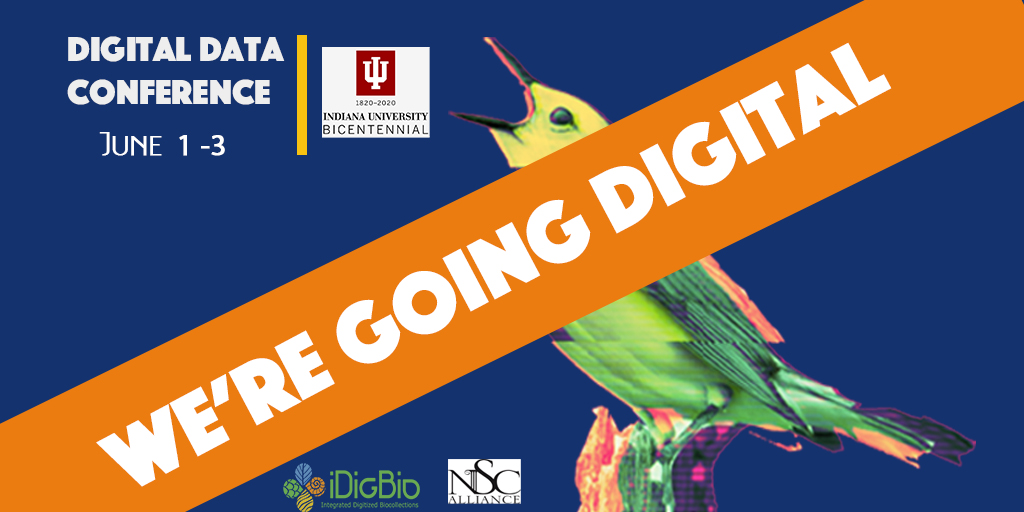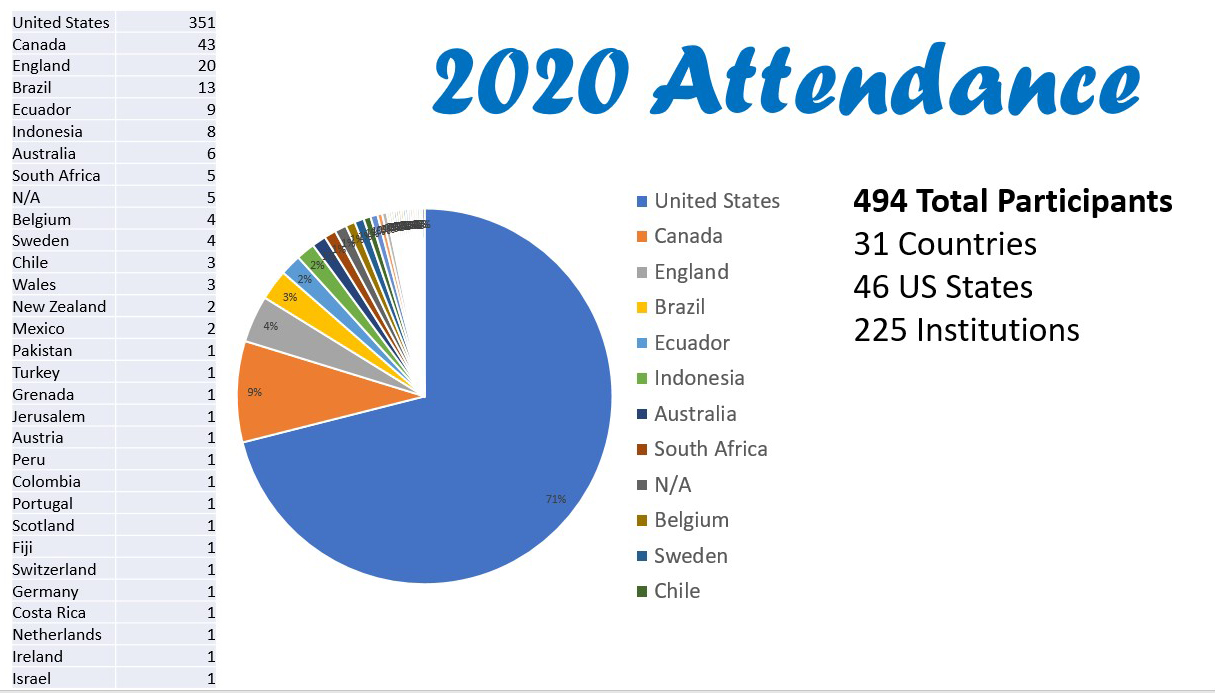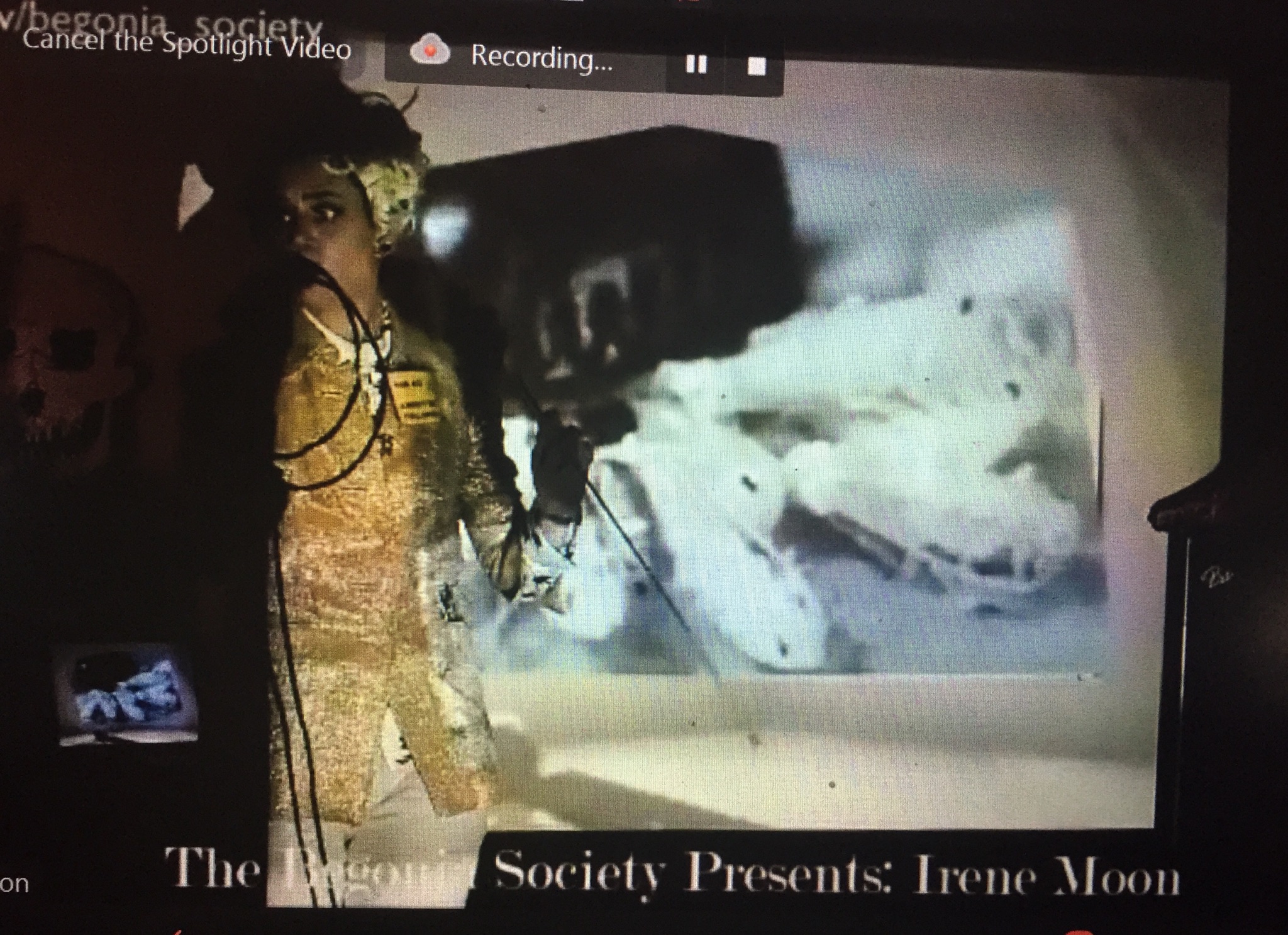
The 4th Annual Digital Data Conference: Harnessing the Data Revolution and Amplifying Collections with Biodiversity Information Science was originally scheduled to be held at Indiana University in Bloomington, IN. Due to COVID-19, the conference was reformatted to a virtual event still hosted by Indiana University. The virtual event proved successful with 494 registrants and an additional 101 attendees joining live, totaling 595 unique attendees. 30% of the attendees were from outside the United States. To draw an international audience the conference planners scheduled the events in three time blocks spanning the day to allow live viewing for different time zones. Oral and posters presenters additionally provided pre-recorded poster descriptions and oral presentations to allow for viewing outside of the live event.

Themes for oral presentations and posters included:
- machine learning and artificial intelligence
- harnessing the data revolution
- published or publishable biodiversity research and data using digitized specimen information,
- methods and protocols for enhancing discovery with digitized specimen data,
- systematics and the use of digital specimen data,
- ongoing research projects that utilize digital data,
- gaps and deficiencies in currently available digital data that hinder effective use,
- user critiques of digital data, aggregators, and data providers,
- pipelines that integrate digitization, data use, and research,
- standards and practices for depositing and documenting open access digital datasets,
- the role and relevance of “Big Data” in biodiversity research,
- use of digitized biodiversity specimen data within ecological research and practice,
- the relative importance of vouchers vs. observations as digital data,
- managing digital biodiversity specimen data in support of research pipelines,
- analyzing and visualizing specimen-based and related digital data,
- digital biodiversity specimen data in education and outreach.
Discussion sessions, workshops, and additional engaging and social opportunities were dispersed throughout the three days of the conference. The conference hosted seven discussion sessions addressing a diversity of topics including: taxonomically intelligent biodiversity data, reliable dataset identifiers, Course-based Undergraduate Research Experience (CURE) using digitized natural history collections data, research data support for small projects, COVID-19 and the value of natural history collections, sharing fossil locality data for paleontological research, and integration of infrastructure for representational data. The conference was also able to include two workshops including an unconference event and a R and the iDigBio API Workshop. The “Evening Social” on the first night also proved to be a huge success. Irene Moon kicked off the evening with her New Wave lecture on cockroaches titled “You, the Charmer” that incorporates psychedelic imagery, pop styled torch songs, and comedy. Following Irene Moon, our IU colleagues hosted two virtual collection tours and provided resources on how to create virtual field trips and collections tours. The night ended with a few socially engaging activities including trivia and meet and greet-type events.

Abstracts and recordings can be found on the conference wiki.
Overall feedback from attendees was exceedingly positive, however, the rush to move the meeting format from an on-site and in-person conference to one of the first all-virtual meetings provided very important lessons to be learned. Zoom web-conferencing and optional meeting registration (due to COVID-19 fiscal uncertainty for many) allowed for conference participation to have more than doubled regular attendance and facilitated increased engagement by individuals that were unable to participate live. However, this rapid transition prevented us from effecting several planned minority student mentoring opportunities that we will rectify in the next iteration. We believe that the substantial increase in geographic representation and institutional affiliations is indicative of a trend toward welcoming a more diverse constituent base in the natural history collections digitization and biodiversity research communities and reflects the organizers’ attempt to seek balance in research, disciplinary, and career stage perspectives. Hence, future conferences will likely be a mixture of in-person and virtual components.
iDigBio is incredibly thankful for the help and support provided by Gary Motz and the team at Indiana University. Their knowledge of online conference technology and experience with virtual events were invaluable. We would like to recognize Kimberly Cook, Jennifer Laherty, Jess Miller-Camp, and Angie Raymond from IU and from iDigBio David Blackburn, Alnycea Blackwell, Jill Goodwin, David Jennings, Erica Krimmel,Molly Phillips and Gil Nelson.
iDigBio is planning a new webinar series focused on virtual collaboration and skills in the post-COVID era. The first two episodes will address tips and lessons learned from the Digital Data and SPNHC conference planners. Click for more information.
SAVE THE DATE: The 2021 event will be an in-person/ virtual hybrid meeting held at the Field Museum in Chicago, IL June 14-16.







